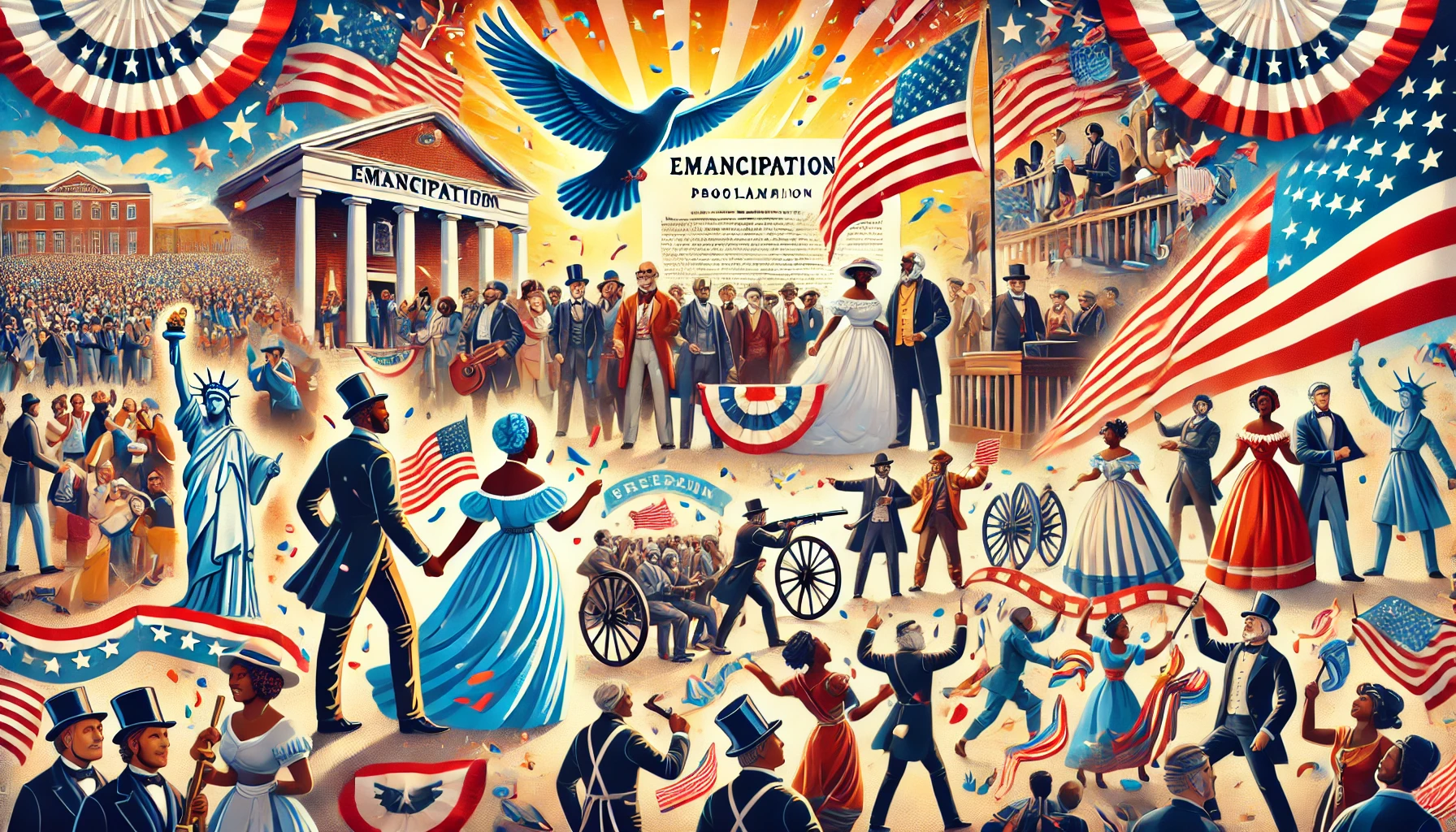
- This event has passed.
Emancipation Day
August 1

Emancipation Day marks a significant milestone in history, commemorating the abolition of slavery in various regions around the world. This day is observed in numerous countries, each with its own specific date and historical background, reflecting the local abolition of slavery laws. The celebration serves as a reminder of the struggle for freedom and the triumph over inhumanity. It’s not just a day of remembrance but also a celebration of cultural heritage and resilience.
Across different nations, Emancipation Day is recognized with public holidays, festive events, and educational programs. These observances not only honor the past but also underscore the ongoing journey towards equality and justice in society. This article delves into the history, traditions, and modern celebrations of Emancipation Day, offering insights into its continued relevance.
History and Meaning
Emancipation Day traces its origins back to the historic moments when laws were enacted to abolish slavery. For instance, in the United States, it is often associated with the signing of the Emancipation Proclamation by President Abraham Lincoln in 1863, which declared the freedom of slaves in Confederate states. Similarly, other countries have their own pivotal dates and figures who played crucial roles in the abolition of slavery.
The day is imbued with profound historical significance, serving as a reminder of the atrocities of slavery and the valor of those who fought to end it. It’s a day to reflect on the struggles for human rights and the ongoing issues of racial injustice and inequality. By understanding its history, we can appreciate the full impact of what emancipation meant for millions of people.
Traditions and Rituals
Traditionally, Emancipation Day is commemorated with a variety of cultural festivities, including parades, music, dance, and storytelling sessions that highlight the history and culture of the formerly enslaved communities. These activities serve as a form of educational outreach, helping to pass the history and significance of the day to younger generations.
In many communities, traditional dishes that were popular among enslaved populations are prepared and shared. These culinary traditions not only offer a taste of history but also celebrate the survival and adaptation of cultural identities that endured through the era of slavery.
Modern Celebration of the Day
Today, Emancipation Day celebrations have adapted to fit modern contexts, incorporating both solemn remembrances and joyous festivities. Many communities use this day to address contemporary issues related to racial injustice and inequality. Workshops, speeches, and panel discussions are common, fostering dialogue on ways to combat discrimination and promote inclusivity.
Furthermore, social media plays a pivotal role in modern celebrations, with people sharing stories, historical facts, and personal reflections related to Emancipation Day. This digital engagement helps to spread awareness globally and connects diverse audiences in a shared commemoration of freedom.
10 Congratulations and Wishes
- “Celebrating Emancipation Day and the enduring spirit of freedom and equality. May this day always remind us of the values we strive to uphold every day.”
- “Happy Emancipation Day! Let’s honor those who fought for freedom with our ongoing commitment to justice and equality.”
- “On Emancipation Day, we reflect on the past struggles for freedom and pledge to continue fighting for the rights of all people. May peace and equality prevail.”
- “Wishing you a reflective and inspiring Emancipation Day. May the triumphs of the past energize our actions today.”
- “Celebrate Emancipation Day by embracing the diversity and unity that this day stands for. Best wishes to you and your family!”
- “May Emancipation Day bring new opportunities for growth, understanding, and unity in our community. Cheers to freedom and equality!”
- “On this Emancipation Day, let’s remember the paths forged by the brave souls of the past and press on towards a future filled with equality and respect.”
- “Happy Emancipation Day! Let’s continue to break the chains of injustice and build bridges of harmony and understanding.”
- “Wishing you a powerful Emancipation Day. Let us all remember the value of freedom and the ongoing need to protect it.”
- “As we commemorate Emancipation Day, let’s renew our commitment to live with compassion and equality for everyone, reflecting on the past to shape a better future.”
10 Unusual Facts
- In some Caribbean countries, Emancipation Day includes the tradition of climbing a greased pole, which symbolizes overcoming struggles.
- The first known celebration of Emancipation Day was in the British Caribbean in the early 19th century, even before slavery was fully abolished.
- Some African nations observe Emancipation Day by retracing slave routes in reverse, symbolizing the journey from captivity to freedom.
- In the United States, different states celebrate Emancipation Day on different dates depending on local laws abolishing slavery.
- Unique Emancipation Day music genres have developed in various regions, blending African rhythms with local styles to celebrate freedom.
- Emancipation Day is also linked to significant advancements in civil rights and is often a time for awarding recognition to modern-day human rights defenders.
- Historical reenactments of slave uprisings and other key events are common on Emancipation Day in many countries, offering live history lessons.
- Emancipation Day festivals often include marketplaces that feature crafts and goods made by descendants of formerly enslaved people, promoting economic empowerment.
- Some libraries and cultural institutions open their archives for free to the public on Emancipation Day, encouraging educational engagement.
- Emancipation Day parades often feature symbolic chains being broken as a powerful visual representation of freedom.
10 Frequently Asked Questions
- What is Emancipation Day? Emancipation Day commemorates the abolition of slavery. It is observed on different dates in various countries, reflecting local laws and historical contexts.
- Why do different countries celebrate Emancipation Day on different dates? The variation in dates is due to the different times when each country or region passed laws to abolish slavery.
- How do people typically celebrate Emancipation Day? Celebrations include parades, cultural performances, educational events, and communal gatherings that focus on history and cultural heritage.
- What are some traditional foods associated with Emancipation Day? Traditional foods often include dishes that were popular among enslaved people, such as ackee and saltfish in the Caribbean or soul food in the United States.
- Can Emancipation Day be observed if it’s not a public holiday in my country? Yes, individuals and communities can observe Emancipation Day through personal reflection, educational activities, or participation in online events.
- What role do children play in Emancipation Day celebrations? Children often participate in educational programs, arts and crafts related to the history of emancipation, and cultural performances.
- Is Emancipation Day celebrated differently in urban vs. rural areas? Yes, urban celebrations may include larger parades and more formal events, while rural areas might focus on community gatherings and local history.
- How has Emancipation Day changed over the years? While traditional elements remain, modern celebrations increasingly address contemporary social justice issues and utilize digital platforms for wider engagement.
- Are there any famous speeches or writings associated with Emancipation Day? Yes, notable figures throughout history have delivered speeches on Emancipation Day, emphasizing freedom, equality, and human rights.
- How can I get involved in Emancipation Day celebrations? Participation can range from attending events, organizing community discussions, to promoting awareness through social media and educational outreach.
Conclusion
Emancipation Day remains a deeply significant observance that not only commemorates a historical milestone but also inspires contemporary society to reflect on and advocate for ongoing issues of freedom, justice, and equality. It’s a day to celebrate the achievements of ancestors who fought for emancipation and to recognize the work still needed to achieve full equality. As we honor this day, let us recommit ourselves to the values of liberty and justice that it stands for, ensuring that the legacy of emancipation continues to influence and guide our actions today.
Emancipation Day is a crucial reminder of the importance of freedom and the continuous effort required to maintain and advance human rights in every community. By engaging with this day, we contribute to a broader understanding and appreciation of the past, laying a stronger foundation for a just and equitable future.
Author’s Opinion
Emancipation Day is more than just a historical date; it’s a vibrant and enduring symbol of the struggle and victory over oppression. It provides an essential moment for reflection and renewal of our collective commitment to human dignity and social justice. Celebrating this day helps to ensure that the stories of courage and resilience in the face of injustice continue to inspire and teach future generations.




